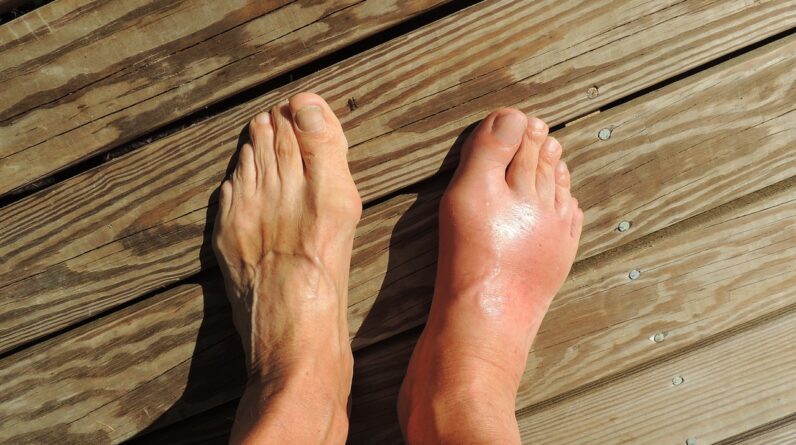
Introduction to Gout and Prostate Problems
Dealing with health issues can be daunting, especially when they are interrelated. Two such conditions are gout and prostate problems. Let’s delve into these conditions and see how they are interconnected.
Understanding Gout
Gout is a type of inflammatory arthritis characterized by severe pain and swelling in the joints, primarily affecting the big toe.
Symptoms of Gout
Common symptoms include acute joint pain, lingering discomfort, inflammation, and redness. At times, the pain can be so severe that even the weight of a sheet can seem unbearable.
Causes of Gout
Gout is caused by an excess of uric acid in the body, leading to the formation of urate crystals around the joints, which in turn cause inflammation and severe pain.
Prostate Problems and Their Types
Men are often vulnerable to various prostate problems as they age, which can impact their overall well-being.
Prostatitis
Prostatitis is a swelling of the prostate gland which can cause discomfort, pain, and difficulties with urination.
Prostate Enlargement (BPH)
Benign prostatic hyperplasia, or BPH, is another common condition where the prostate gland becomes enlarged, causing issues with urination.
Prostate Cancer
Lastly, prostate cancer is a severe and potentially life-threatening condition that requires early detection and treatment.
Gout and Prostate ConnectionRecent studies have suggested a potential link between gout and prostate problems. High levels of uric acid associated with gout could potentially influence the development of prostate issues.
Risks of Having Both Gout and Prostate Issues
Impact on Quality of Life
Having both conditions could significantly affect one’s quality of life due to recurrent pain and urination problems.
Possible Complications
Furthermore, complications can arise if both conditions are left untreated, including kidney stones from gout and urinary retention from prostate issues.
Treatment for Gout and Prostate Problems
Treatment for Gout
Gout treatments generally involve medications to control pain and reduce uric acid levels.
Treatment for Prostate Problems
For prostate issues, treatment can range from medications to minimally invasive procedures, or in severe cases, surgery.
Lifestyle Changes for Management
Diet Recommendations
Eating a healthy diet can help manage both conditions. Reducing purine-rich foods like red meat and shellfish can help control uric acid levels in gout, while foods rich in antioxidants can potentially improve prostate health.
Importance of Exercise
Regular physical activity can reduce gout flare-ups and may also help in maintaining a healthy prostate.
In Closing
Gout and prostate problems can significantly affect the quality of life. However, with effective treatment and lifestyle modifications, you can manage these conditions effectively.
Understanding both gout and prostate problems, their connection, and their impact on your health is essential in seeking the right treatment and implementing the lifestyle changes required. While the journey towards managing these conditions may seem challenging, remember that you are not alone. Healthcare professionals, including doctors and dietitians, are there to provide assistance and guide you through your health journey. Moreover, support from family and friends can also be an essential pillar in coping with these conditions.
Now that we’ve covered the ins and outs of gout and prostate problems, we hope you’re better equipped to manage these conditions or help someone else who may be dealing with them. Remember, these conditions are treatable, and with proper lifestyle changes, they can be effectively managed.
Whether it’s you or someone close to you grappling with these health conditions, always remember: understanding is the first step to overcoming. So, stand strong, stay informed, and keep your health in check.
So, let’s take a proactive stance towards our health. After all, our health is the cornerstone of our quality of life. Let’s manage it well, shall we?
Frequently Asked Questions
- Is gout linked to prostate cancer? Gout is not directly linked to prostate cancer, but elevated uric acid levels might contribute to prostate issues.
- Can diet influence gout and prostate problems? Yes, diet can significantly influence both conditions. A healthy diet low in purines can help manage gout, while foods rich in antioxidants can improve prostate health.
- Can gout medication help with prostate issues? Gout medication specifically targets uric acid levels and inflammation in the joints, so it does not directly help with prostate issues.
- Are these conditions curable? While gout and prostate issues can be managed effectively with lifestyle changes and medical treatment, they are usually not completely curable, especially if they are chronic conditions.
- Can I prevent gout and prostate issues? Certain lifestyle changes can help reduce the risk, such as maintaining a healthy weight, regular exercise, and a diet rich in fruits, vegetables, and whole grains, and low in red meat, shellfish, and alcohol. Regular medical check-ups are also crucial for early detection and treatment.
- Are younger people at risk of developing these conditions? While these conditions more commonly affect older individuals, younger people can still be at risk, particularly if they have a family history of gout or prostate problems or lifestyle factors such as an unhealthy diet, sedentary behavior, or obesity.
- Can these conditions be life-threatening? If left untreated, complications arising from both conditions, such as kidney stones or urinary retention, can be potentially life-threatening. However, with appropriate treatment and management, the risk is significantly reduced.
- Can regular exercise worsen these conditions? While high-intensity exercise may trigger a gout flare-up, moderate exercise is generally beneficial for both conditions.
- Do these conditions affect women? While gout can affect both genders, prostate problems, by nature, only affect men. Women do not have a prostate gland.
- How frequently should I get checked if I have these conditions? The frequency of check-ups can vary depending on the severity of your conditions. However, it’s generally recommended to have regular follow-ups with your healthcare provider to monitor the progress of your treatment. Always consult with your healthcare provider for the best advice.







